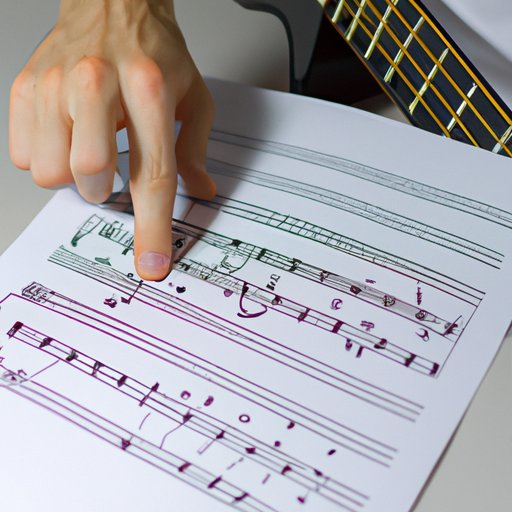Introduction
Learning how to play the guitar is an exciting yet challenging process – but it’s definitely worth it! Not only is playing guitar a great way to express yourself creatively, it also provides numerous mental benefits such as improved focus and increased problem-solving skills. In this article, we’ll discuss how to get started with learning guitar, from researching different guitar styles and genres to finding a qualified teacher or instructor and more.
Research Different Guitar Styles and Genres
The first step to learning guitar is researching different guitar styles and genres. There are many different types of guitars, including acoustic, electric, classical, and bass guitars. Each type of guitar has its own unique sound and can be used to play different genres of music. For example, if you’re interested in playing blues or rock music, an electric guitar would be best. If you’re interested in classical or folk music, an acoustic guitar would be better suited.
When deciding which type of guitar and genre you’d like to learn, it’s important to listen to a variety of music and explore different types of guitars. According to a study by the National Endowment for the Arts, “listening to music activates multiple regions of the brain, including areas involved in movement, planning, memory, emotion, and reward processing.” So take your time and really listen to different types of music so that you can determine what style or genre you’d like to pursue.

Find a Qualified Guitar Teacher or Instructor
Once you’ve decided what type of guitar you’d like to learn, it’s important to find a qualified teacher or instructor. While there are plenty of online tutorials and videos available, having an experienced teacher or instructor can make all the difference. Having a qualified teacher or instructor can help you stay motivated, give you valuable feedback, and provide personalized guidance based on your individual needs.
When looking for a guitar teacher or instructor, it’s important to research their qualifications and experience. Make sure they have a good understanding of the type of guitar you want to learn and that they have experience teaching it. It’s also helpful to ask for references and read reviews from previous students. Most importantly, make sure you feel comfortable with them and that they are able to provide the level of instruction that you need.

Buy or Rent Quality Equipment
Having quality equipment is essential when learning guitar. Even if you’re just starting out, it’s important to invest in a quality instrument. If you’re unsure of which type of guitar to purchase, it’s helpful to talk to a knowledgeable salesperson at a local music store. They can help you decide which type of guitar is best for your needs and budget.
If you’re on a tight budget, you may want to consider renting or borrowing a guitar. Many guitar stores offer rental programs, and most cities have community music organizations where you can borrow an instrument for a small fee. You can also check online classifieds or websites like Craigslist for used instruments.
Practice Basic Chords and Scales
Now that you have a guitar and a qualified teacher or instructor, it’s time to start practicing. The key to successful guitar playing is repetition and practice. Start by learning basic chords and scales, and then gradually move onto more complex pieces. As you practice, focus on building dexterity and knowledge. This will help you develop the muscle memory needed to play comfortably and accurately.
It’s also helpful to break up your practice sessions into short chunks. According to a study by the University of North Florida, “short practice sessions were associated with greater improvement in performance than longer practice sessions.” So try to practice for 15-20 minutes several times a week rather than one long session.
Listen to and Analyze Recordings
In addition to practicing, it’s important to listen to and analyze recordings. Listening to recordings can help you learn new techniques and develop a better understanding of music theory. When listening to recordings, pay close attention to the dynamics, tone, and phrasing. Try to identify the chords and scales being used, and analyze how the musician is using them to create a certain sound or feeling.
It’s also helpful to transcribe songs. Transcription is the process of breaking down a song note-by-note and writing it out in notation. This is a great way to improve your ear training and gain a deeper understanding of music theory. It can also help you develop a better sense of rhythm and timing.

Develop a Practice Routine and Set Goals
Developing a practice routine and setting goals are important steps in becoming a better guitarist. Having a practice routine will help you stay focused and motivated, and setting achievable goals will help you measure your progress. When creating a practice routine, make sure to include activities such as warm-ups, technical exercises, and improvisation. This will help you build a strong foundation and develop a well-rounded skill set.
When setting goals, make sure they are realistic and achievable. For example, instead of aiming to become a master guitarist overnight, focus on mastering a few simple chords or scales. As you reach these goals, gradually increase the difficulty and complexity. This will help you stay motivated and keep progressing forward.
Conclusion
Learning how to play the guitar can be a daunting task, but with the right attitude and dedication, it can be very rewarding. Start by researching different guitar styles and genres, and then find a qualified teacher or instructor. Invest in quality equipment and practice basic chords and scales. Listen to and analyze recordings, and develop a practice routine and set goals. With hard work and dedication, you can become a successful guitar player.
(Note: Is this article not meeting your expectations? Do you have knowledge or insights to share? Unlock new opportunities and expand your reach by joining our authors team. Click Registration to join us and share your expertise with our readers.)
